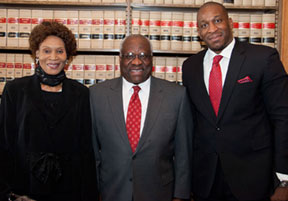Lessons From a Nigerian Entrepreneurial Queen (463)
(
NewsUSA) - President Barack Obama's second inauguration, so serendipitously held on the birthday of Martin Luther King Jr., wasn't just a transcendental moment for Americans. The day resonated for thousands, but for Nigerian noblewoman, economist, and banker, The Otunba Ayora, Bola Kuforiji-Olubi, it was magic, instructive -- a beautiful experience.
"Coming for the second inauguration ceremony of President Obama opened my eyes to see some things that [Nigeria] can invite from your electoral system. There was no acrimony, no fight, no rancor," Dr. Olubi explained.
It sparked a surreal visit to the U.S. Dr. Olubi, who was born in 1936 and held office as Nigeria's minister for commerce and tourism in 1993, has achieved more "firsts" than most people can imagine. She is an entrepreneurial spirit and a resilient woman of fervent ambition.
Dr. Olubi's trip held a series of heart-warming highlights. Her and her eldest son, Tokunbo Kuforiji, felt blessed to speak at length with Supreme Court Justice Clarence Thomas and delighted in a private tour of Johns Hopkins University Hospital by their own director of pediatric neurosurgery, Dr. Benjamin S. Carson.
But the 77-year-old -- a queen in her own right -- had her own chance to inspire. She moved an audience to tears as the featured speaker at a reception for the freshly-minted senator from South Carolina, Tim Scott.
"She is a woman of firsts; meeting her is a wonderful thrill and honor for me, and for everyone else she has encountered on this visit to our country," said Scott, praising Dr. Olubi's exemplary career.
The Otunba Ayora was the first female chairperson of United Bank for Africa. She also sat on sustainable development advisory boards for the UN, became the first Nigerian female CEO of a multinational company, and the first female president of the Institute of Chartered Accountants of Nigeria.
"I wanted to have an edge over the person sitting next to me," says Dr. Bola. "I'm proud of the fact that in most of the things I've done, I've been well-educated to equip myself. Having a combination of economics and finance has equipped me to be able to work and function properly in the private sector in business and also in the public sector."
In an effort to strengthen the presence of Nigerian women in business, Dr. Olubi helped found the Society of Women Accountants of Nigeria. "I pride myself on being a person that is able to juggle several balls in the air at the same time. It takes a lot of hard work, a lot of diligence," says Olubi. "And you have to make sure your home front doesn't suffer much, and your work is such that your peers, your superiors, your colleagues, are all seeing you in a positive light."
